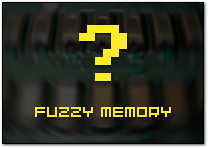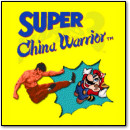Archive for August, 2010
[ Retro Scan of the Week ] Grolier’s Encyclopedia on CompuServe
Monday, August 23rd, 2010For my sixth grade social studies class, I wrote a report on Mikhail Gorbachev, former President of the Soviet Union. And he really was “former” then — the USSR had fallen apart just two years prior to my report in 1991. For that report — which I ran across recently — I used every resource available to me, including a novel one at the time: Grolier’s Encyclopedia on CompuServe Information Service. My family subscribed to CompuServe — that massive, pre-ubiquitous-Internet dial-up service that cost amazingly large fees an hour — and I loved it.
What you see above is part of the Gorbachev encyclopedia entry in the form of a dot-matrix printout from the DOS version of CompuServe Information Manager (a front-end client for CompuServe) that I printed myself. Various lines are crossed out and underlined, noting areas of interest that I was to paraphrase for the report. This wasn’t plagiarism — I even cited the online encyclopedia in my report’s bibliography. That fact is actually kinda impressive to me in retrospect.
CompuServe’s online encyclopedia was amazing at the time (1992-1993 era). It was so easy to just search for a term, look it up, and print it out. It sure beat our family’s musty 1968 World Book Encyclopedia set that I used for every report prior to this one (yes, the information in my reports was often woefully out of date). For Christmas 1993, my dad bought us Microsoft Encarta on CD-ROM, and that served as the meat of my school reports for the next few years after that. But that’s another story entirely.
Discussion Topic of the Week: When did you first use an electronic encyclopedia — CD-ROM or otherwise? What did you use it for?
ULAF CAPTURE THE SPEED WITH SPEEDBOARDS
Thursday, August 19th, 2010
SOME PEOPLES ASK ULAF THIS: HOW IS IT THAT MY MIND CAN CAPTURE THE SPEED? TO WHICH ULAF RESPAWN A SIMPLE WORDS: WITH THE SPEEDBOARDS OF COURSE. IT IS TRUE THAT THE SPEED OR THE BOARDS HAVE BEEN HARDEST TO TAME OF ALL ELEMENTS, SO THE MAGIC OF THESE DEVICE CANNOT BE UNDERSTOOD.
SO THEN ALWAYS RECALL THIS DAY THAT HERE YOUR MIND SEES THIS SPEEDBOARDS PHOTOGRAPHY, ONE PICTURES OF THAT ULTIMATE MASTER DEVICES FOR THE NINTENDO ENTRAPMENT SYSTEM (NES FOR ABBREVIATED). ULAF USE IT AND USE IT, THEN OBTAIN HIGHEST SCORE EVER DURING MEGA MEN II WITH FINGERTIPS. NO SMALL FEET.
JUST A QUICK NOTE FROM MY MIND. GO BACK TO LIFE NOW. UNTIL NEXT TIME THIS IS ULAF SAYING BE THE MASTER.
—
Ulaf Silchov is an expert in video games and computers. He also writes for “Svadlost Weekly” and “The Almost Perfect Circle Newsletter.”
[ Retro Scan of the Week ] Quake II Meat Market
Monday, August 16th, 2010 “Hand-cranked and chock full of juicy new tidbits.
“Hand-cranked and chock full of juicy new tidbits.
All stuffed into authentic id Software casing.”
Quake II will be 13 years old this December — has it been that long already? Seen here is a 1999 advertisement from EGM promoting the PlayStation and Nintendo 64 ports of the classic PC shooter. The designers of the ad chose a clever theme that parodies a grocery store circular (commonly inserted into newspapers here in the US), complete with a fake coupon and flashy pricing. Very clever, and very effective.
Discussion Topic of the Week: Let’s talk Quake. Best game console version of Quake? How about Quake II?
The Apple G4 Cube Turns 10
Thursday, August 12th, 2010Ten years ago this month, Apple shipped the Power Mac G4 Cube, a unique computer that fared poorly in the marketplace but captured the imaginations of many computer enthusiasts. Naturally, I warmed up my dexterous typing fingers and wrote something about this anniversary. Well, two somethings, in fact, and they’re both up on Macworld.com today.
The first, “The Cube at 10: Why Apple’s Eye-Catching Desktop Flopped,” is an exploration of reasons why the Cube fared so poorly sales-wise.
The second, “Apple’s Cube Was Ahead of Its Time,” compares and contrasts the G4 Cube and the Mac Mini, exploring in particular why the Mini was successful when the Cube was not.
I’d like to thank my editor at Macworld, Philip Michaels, who always does an excellent job of distilling my work into crystal clear prose.
I Wanted One
On a personal note, when Apple announced the G4 Cube in 2000, I thought it was amazing and I immediately wanted one. Although I’d traditionally been a PC-clone user, I had been following Apple news closely since the return of Steve Jobs in 1996.
Of course, I couldn’t afford a Cube, so I simply pined away and read about others’ Cube experiences online. I remember the “cracks” issue being a fiasco in the news after the Cube’s release (one my articles discusses that issue), which seemed embarrassing for Apple.
Overall, I’m glad I didn’t buy one, because they were very expensive. I’m lucky I only had a credit card with a $200 limit (Amazingly low, isn’t it? That was just before banks started throwing high-APR credit at everyone and their brother. Now I can’t get them to stop raising my limit.) I still don’t own a Cube, so if anyone wants to donate one to the cause, I’d be willing to listen.
Anyway, I hope you enjoy the articles. Feel free to share your G4 Cube memories below.
[ Retro Scan of the Week ] All Hail Bob, Destroyer of Worlds
Monday, August 9th, 2010 The pagan god manifests in many forms, demanding a tribute of small children.
The pagan god manifests in many forms, demanding a tribute of small children.
This image is part of a two-page double-sided fold out ad attached to the back cover of Home PC magazine. Its main subject was not actually Microsoft Bob, but a Micron P75 PC (click there to see that page).
Microsoft designed Bob (1995) to serve as a friendly graphical interface and operating environment for beginners, but the product flopped mightily and has since become a tech punchline.
Speaking of Bob, my buddy Harry McCracken has written more about Microsoft Bob than any other living human being on the planet. A good place to start would be his Bob Chronicles, which talks about the origins and history of Bob.
Discussion Topic of the Week: Have you ever used Microsoft Bob? What did you think about it?
[ Fuzzy Memory ] Grinning Triangle Man Toy
Wednesday, August 4th, 2010 Every once and a while, I receive emails from people looking for a certain game, electronic toy, or computer from their distant past. I then pass it on to intrepid VC&G readers to crack the case.
Every once and a while, I receive emails from people looking for a certain game, electronic toy, or computer from their distant past. I then pass it on to intrepid VC&G readers to crack the case.
The Clues
Pseudo3D writes:
Hello. While reading about the Sega Pico on another website, I suddenly had a flashback to a toy I used to have a long time ago. I’m going to describe it in the best detail I can…
It was a yellow toy made by Texas Instruments (96% sure), all yellow (logo was in blue). It was larger than a modern TI graphing calculator or an original Game Boy, and also had a handle. Anyway, it consisted of an LCD screen (like a calculator would have), the mascot (I guess) was a grinning triangle man. To run the “games”, you inserted a card into the front, which was a flimsy-looking touch-sensitive surface. The cards were made of paper and had a colored border on one side. The games were relatively simple. One was a simple calculator card, one had this Simon-like memory game…I’d say there were about 20 or so cards (I think they were two-sided). Unfortunately, when I google Texas Instruments toys, all I get is Speak & Spell (and its variants) and two more things that were definitely not it. Can you help?
The Search Begins
It’s up to you to find the object of Pseudo3D’s fuzzy memory. Post any thoughts or suggestions in the comments section below. Pseudo3D will be monitoring the comments, so if you need to clarify something with him, ask away. Good luck!
—
Have a memory of a computer, video game, computer software, or electronic toy you need help identifying? Send me an email describing your memories in detail. Hopefully, the collective genius of the VC&G readership can help solve your mystery.
A Study of Operating System Games
Monday, August 2nd, 2010Many computer operating systems throughout history have shipped with at least one free game — Solitaire and Minesweeper are some of the most famous examples. Knowing this, I thought I’d take a stroll through history and examine other OS pack-in games.
I ended up with an amusing collection of over twenty games from 1971 to the present. The resulting gallery is up now on Technologizer. I hope you enjoy it.
[ Retro Scan of the Week ] ASG Video Jukebox
Monday, August 2nd, 2010 “ASG: Eating the Rules” (It really says that.)
“ASG: Eating the Rules” (It really says that.)
Rack and stack, Jack! This totally radical ASG Video Jukebox allowed you to play six of the Sega Genesis games you already owned for only $49.99. Imagine finally being able to play those games you bought without having to insert and remove them from the system every time. Imagine.
The problem with this device was one of scale. If you had only six carts to choose from, it’s wasn’t worth buying a jukebox device to let you switch between them quickly: keeping track of six cartridges was easy. The ad says you could chain up to six of these jukeboxes together for a total on-line selection of 36 carts. By that point you were looking at a $300 investment in gadgets that weren’t actually that useful.
On the other hand, if you had a device that let you switch between 100, 200, or 500 carts at once, that would have been legitimately handy. But the device would have cost $1000 and nobody owned that many carts back then anyway. Today, we have the same functionality in the form of emulator software, so lazy Genesis fans have long since been appeased.
If anybody actually bought one of these, I’d be interested to know about it.
Discussion Topic of the Week: How many Sega Genesis cartridges do you own? How many did you own in 1994?








